1968 Shelby GT350 Fastback....All original survivor
- Location: Broadview Heights, Ohio, United States
- Make: Shelby
- Model: Cobra
- Type: Fastback
- Trim: GT350
- Year: 1968
- Mileage: 146,000
- VIN: 8T02J116117
- Color: Red
- Engine size: 302 V8
- Number of cylinders: 8
- Power options: Air Conditioning
- Fuel: Gasoline
- Transmission: Automatic
- Drive type: RWD
- Interior color: Black
- Vehicle Title: Clear
1968 Shelby Cobra GT350 Description
HISTORY:
After its debut at the 1964 New York World’s Fair, Ford soon realized that the Mustang, although a tremendous sales success, needed more of a performance image. So, they turned to Carroll Shelby who knew that racing would be the key to creating the image Ford desired. Shelby’s first step would be to create a successful racing version of the Mustang. The result was the GT350R, a factory-prepared racecar. Only 37 R-models were built yet they dominated the SCCA’s B-Production class for the next three years. Shelby also constructed 516 street versions of the GT350. Like the R-models, these cars featured Ford’s K-code 289 V-8 modified to produce a reported 305 bhp. Beginning as a stock Mustangs, with 4-speed manual transmissions, they were delivered to Shelby American to receive high-riser manifolds, heavy-duty rear axles, better brakes all around and different badging. These first GT350s were not built for comfort as they had racing suspensions and the rear seats were removed to comply with SCAA homologation rules. Mustang sales across the board benefited tremendously from the racing successes of the GT350 not only in SCCA “club” racing but also in the very popular Trans-Am series. The production Mustangs modified by Shelby American became hot sellers and increased production was planned for 1966.
Then in 1967, Ford restyled the Mustang and in the process, it became a larger and heavier car. Shelby’s engineers thus had to adapt the GT350 as well. To keep the car’s weight down and maintain the model’s distinctive look, a new fiberglass front end was designed. They incorporated a larger hood scoop and brake cooling scoops on the sides of the car in front of the rear wheels as well as scoops on the rear-quarter panels of the roof. Additionally, high-beam headlights were mounted at the center of the grille opening giving the car an aggressive face. The rear end received a built-in spoiler and large banks of taillights on either side of the fuel filler. The GT350’s interior was also made more comfortable and both power steering and power brakes became “mandatory options.” Generally, buyer’s tastes were changing and the Shelby Mustang was becoming more of a luxury performance car.
This trend continued in 1968 as appearance and convenience were emphasized in Mustangs even more. Carroll Shelby in turn started to ease out of the car building business and the conversion of Mustangs into GT350s was moved from his Los Angeles facility to the A.O. Smith Company in Livonia, Michigan. For 1968 factory built 302 engines replaced the high-performance 289, and when Ford took over all of the promotion and advertising for the Shelby models, they were portrayed as more civilized cars. Officially the model’s name was also changed to Shelby Mustang Cobra GT350 and new badging used. Styling changes included a revised front end with inboard fog lamps instead of the high beam headlights and a new convertible body was offered. While these changes may have disappointed some enthusiasts, it certainly did not hurt sales. More Shelby Mustangs were sold in 1968 than in any other year.
The subject car (#8T02J116117) is a 1968 Shelby Mustang Cobra GT350 Fastback; one of 4,450 total Shelby Mustangs built that year, of which 1,053 were fastbacks. According to the Shelby American World Registry this car was built on November 22,1967, at Ford’s Metuchen, NJ assembly plant, and sold new through Schanzmeyer Ford in Jefferson City, MO. Its first owner is unknown, but by 1983 the car was found and purchased by a Robert Suchack in Arizona. He in turn sold it to Gary Ellsworth, also of AZ, for $7,000. Ellsworth kept the car for 27 years, and is listed as the owner in the 1997 registry. Sometime during this period, the power steering was removed and replaced with a manual ratio steering box.
The current owner acquired the car from Classic Ford Broncos in Powell, OH. Currently this GT350 has 146,665 miles on it and has never been restored. It retains its correct 302-cid V8 engine and C-4 Select Shift Automatic transmission. Additionally, the car’s paint and all its body panels, except for the right front fender, are believed to be original. Important optional equipment from new include “Selectaire” air conditioning, and tinted glass. Although headrest seats were available on Shelby Mustangs in 1968, they were not originally ordered on this example.
CONDITION:
Poor to fair Candyapple Red paint that is believed to be mostly original from the factory. It exhibits scratching, fading as well as obvious areas of loss, especially across the cowl between the hood and windshield. Good tinted windows and windshield that show the chips and scratches expected on a forty-nine-year old car. The exterior trim is complete and in similar condition. According to correspondence, provided by the owner, the seats and headliner were replaced about seventeen years ago, and both remain in very good condition. The interior trim is in good condition with brightwork showing discoloration and light surface corrosion in places. The black carpet is worn, particularly in the driver’s foot well and there is a small tear in the vinyl on the console armrest. The engine bay is not detailed and exhibits signs of wear from use. There is no air cleaner present and the carburetor is an aftermarket Edelbrock unit. Good ten-spoke Shelby-style alloy wheels, that are discolored, fitted with newer P205/70 R15 Goodyear Assurance tires.
Indicated Mileage: 46,665
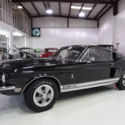 1968 Shelby Mustang GT350 Fastback Owned by Carroll Shelby | Highly original
1968 Shelby Mustang GT350 Fastback Owned by Carroll Shelby | Highly original
Mileage: 77,096
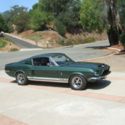 FORD MUSTANG SHELBY 1968 GT350 FASTBACK GENUINE DOCUMENTED SURVIVOR
FORD MUSTANG SHELBY 1968 GT350 FASTBACK GENUINE DOCUMENTED SURVIVOR
Mileage: 68,000
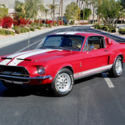 NO RESERVE 1968 SHELBY GT350 FASTBACK CANDY APPLE RED DOCUMENTED SHELBY MUST SEE
NO RESERVE 1968 SHELBY GT350 FASTBACK CANDY APPLE RED DOCUMENTED SHELBY MUST SEE
Mileage: 82,788
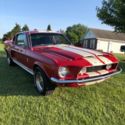 1968 MUSTANG SHELBY GT350 REPLICA FASTBACK built on 1967 GT Fastback S code
1968 MUSTANG SHELBY GT350 REPLICA FASTBACK built on 1967 GT Fastback S code
Mileage: 45,000
 1968 SHELBY GT350 2 DR FASTBACK
1968 SHELBY GT350 2 DR FASTBACK
Mileage: 66,263
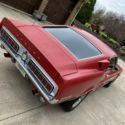 1968 Shelby GT350 Fastback
1968 Shelby GT350 Fastback
Mileage: 147000
 1968 Shelby GT350 Hertz Fastback
1968 Shelby GT350 Hertz Fastback
Mileage: 87000
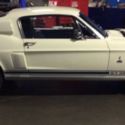 1968 Shelby Mustang Cobra GT350 Fastback
1968 Shelby Mustang Cobra GT350 Fastback
Mileage: 62,617
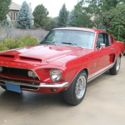 1968 Shelby Mustang GT350 Hertz Fastback
1968 Shelby Mustang GT350 Hertz Fastback
Mileage: 86959
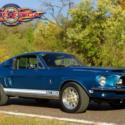 1968 Shelby Mustang Cobra GT350 Fastback Supercharged
1968 Shelby Mustang Cobra GT350 Fastback Supercharged
Mileage: 97,792












